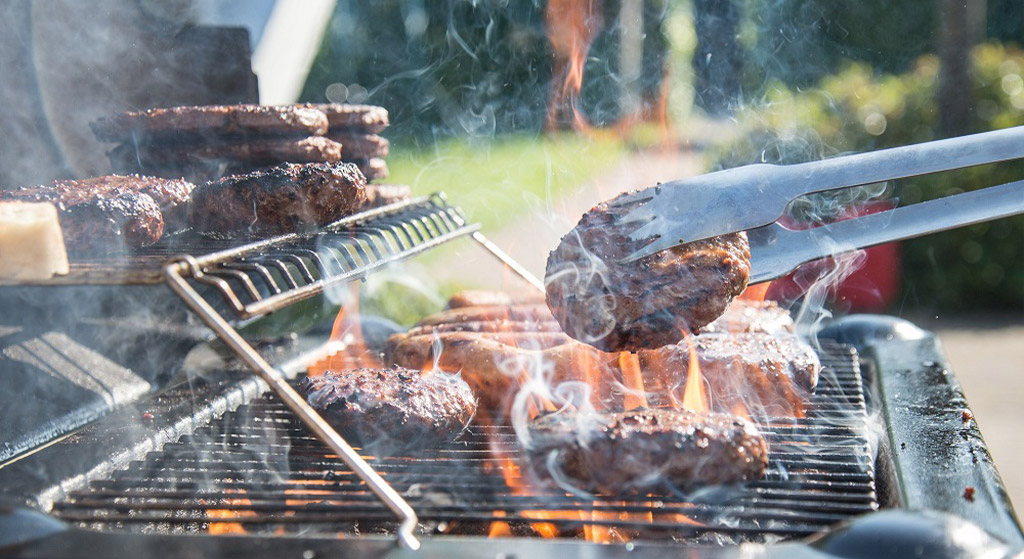
How To Get Your Grill Ready For Summer
Summer is almost here, which means grilling season is just around the corner, and just in time because Americans love their barbecues. There really is nothing quite like the sweet, smoky smell of a backyard grill. From char-broiled hamburgers, to browned sausages, to grilled vegetables, there are so many different types of food that taste delicious cooked on the barbecue. Now, before you fire up your grill for the season and don your “Kiss The Cook” apron, check out these grill preparation suggestions that’ll have you barbecuing (appropriately & safely) in no time!
Table of Contents
Gas Grills
Step 1. Survey your grill
Since your grill has been in hibernation for a few months, you’re going to want to inspect it. Take a look at all of its components and check to see that everything’s in its proper place and undamaged. If you notice that your hose seems compromised, replace it. If your gas tubes are worn out, replace those. If your gas tubes are clogged, clear the blockage with a pipe cleaner. Test out the knobs on your grill to make sure that they are still working correctly. Tighten up any bolts or screws that seem loose, check for rust and fill up your propane tank with a certified propane refiller. Before doing any repairs to your grill, be sure to disconnect the propane tank. These are all safety precautions and should be followed before grill use for optimal protection.
Step 2. Clean your grill
It’s very important to keep your grill clean, and not just because of sanitary reasons. Research from the National Fire Protection Association has shown that roughly one of every five grill fires are due to the grill not being cleaned. To prevent fires, keep the grill clean. Here’s how to do that! Use a tough, wire brush to scrub clean any uncoated steel or iron parts of your grill. Do not use abrasive cleaning products or tools on any aluminum parts since they can be damaged by those types of products and tools. Deep clean grates by soaking them overnight in a mixture of vinegar and baking soda, then rinse and scrub them the next morning. Don’t forget to empty out the grease trap as well!
Step 3. Test out your grill
Before you put any food items on the grill, turn it on, ignite it and let it burn for a little while. Pay attention to how the burners are firing, and take note of any gassy smells that could be associated with a gas leak. According to the National Fire Protection Association, 12% of gas grill structure fires and 24% of outside gas grill fires were caused by leaks or breaks. Even if you don’t smell gas, test for gas leaks by first double checking that everything on the grill is turned off, and bringing your grill outdoors if you haven’t already. Connect the hose to the propane tank and brush soapy water (half water & half liquid dish detergent) onto the gas value, the hose and the regulator. Then turn on the gas tank valve. If bubbles form, you have a leak and you should not use the grill. Turn the gas tank off immediately.
Charcoal Grills
Step 1. Clean your grill
Charcoal grills have less components than gas grills so they are typically easier to clean, but still just as important to do so. Use a stainless-steel brush to scrape off any ash or carbonized grease. Empty out any ash that has collected in the bowl, the ash catcher and/or the lid of your grill. From there simply use soapy water and a sponge to finish up the job. Then rinse clean. Brush all grates clean and scrape the inside of the kettle grill. One of the best times to clean your grill is right after using it since the remaining heat aids in removing food residue. If (and whenever) possible, scrape your charcoal grill clean shortly after use.
Step 2. Practice proper safety precautions
Statistics from the National Fire Protection Association state that charcoal or other solid-fuel grills were involved in 1,300 home fires per year, while gas grills were involved in an average of 7,900 home fires per year. Even though charcoal grills are involved in less annual fires than gas grills, it’s still important to be vigilant. Never leave your grill unattended while in use and always position your grill in a well-ventilated area away from the home and other things that can burn. This goes for both charcoal AND gas grills.

